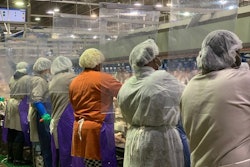
Millennials – born between 1983 and 1996 – are concerned about how meat products are handled and packaged during the pre-purchase phase, according to a new poll that assessed the impacts of COVID-19 on consumer habits. What can poultry marketers do to reassure nervous shoppers?
Millennials are reacting to the pandemic differently than other generations. Half of the millennials surveyed indicated they were more concerned about food safety because of COVID-19, compared to a third (35%) of the general population.
This should not be surprising given the food safety concerns millennials have had for years now, but I do believe that COVID-19 gives them an opportunity to learn more about how their food is produced.
There is currently no evidence of human or animal food or food packaging being associated with the transmission of the coronavirus that causes COVID-19, according to the U.S. Food and Drug Administration (FDA).
A simple google search regarding their concerns should put their minds to ease, however, that assumes they use a reputable source, like the FDA. Not to mention, research suggests that heat inactivates COVID-19, so properly cooked meat should not be a concern regardless.
Processing plant shutdowns in the national news have created a meat shortage in some areas and scared the general consumer.
During the pandemic, millennials think about meat purchases differently than other generations, the poll revealed. They were more likely to:
- Purchase more meat overall (37% vs 20%)
- Freeze meat more often (68% vs 48%)
- Stock up on meat more (61% vs 32%)
- Be concerned about limited meat sales in the future (84% vs 64%)
I have seen a lot of livestock operations offering animals for sale that are ready for harvest on different social media platforms. I have even had several people of the millennial age (my age) reach out to me about buying beef from my family's operation.
Some of their questions are valid, while others not so much. However, I have had the opportunity to explain withdrawal dates and that all meat is antibiotic-free. I also explained to one gentleman what GMO's are.
I saw where one producer was selling live fat hogs for US$100 per head – which is devastating from a producer's standpoint. The post generated a lot of interest from consumers asking questions and looking to buy. Suddenly, how they were raised did not matter – I did not see a single comment regarding the commercial house they were in.
For the first time in a long time, some consumers are looking directly at the farmer for answers and products, which offers a learning opportunity. It is not much, but during a lot of darkness at least there is a little light.
Who knows, maybe now that millennial consumers have gained a little better understanding of the food supply chain through COVID-19 those associated with it will see more appreciation? Unfortunately, I kind of doubt it.
View our continuing coverage of the coronavirus/COVID-19 pandemic.














